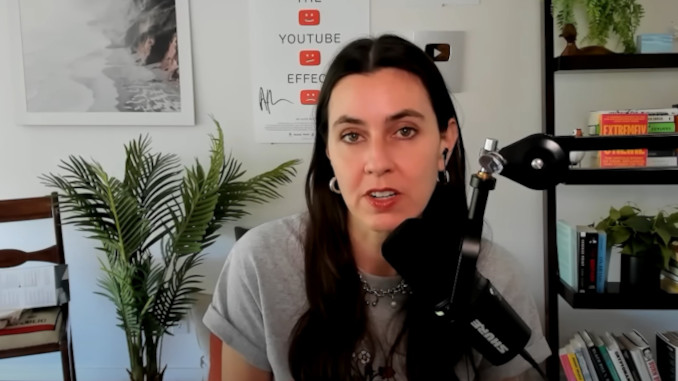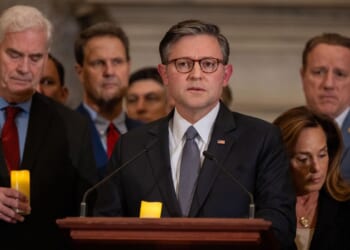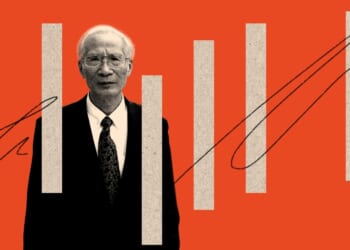
By José Niño
A secretive program that paid prominent Democratic influencers up to $8,000 per month has erupted into a major controversy, exposing the party’s struggle to compete in the digital arena while raising serious questions about transparency and audience trust.
Click the Link Below to Listen to the Audio of this Article
The Chorus Creator Incubator Program, funded by the Sixteen Thirty Fund and revealed in a Wired magazine investigation by generally hysterical far-left social media “influencer” Taylor Lorenz, contracted with roughly 90 progressive social media personalities to participate in what organizers called a “pro-democracy learning community.” High-profile voices included: Olivia Julianna, the Gen Z activist who spoke at the 2024 Democratic National Convention; independent YouTube host David Pakman; and Leigh McGowan, known online as “Politics Girl.”
Together, these creators command a collective audience of more than 40 million followers across TikTok, YouTube, and Instagram. Yet the contracts they signed contained restrictive provisions that alarmed ethics experts and fellow content creators.
The agreements prohibited participants from disclosing their relationship with Chorus or its funding source, the Sixteen Thirty Fund. Creators faced being “kicked out and essentially cut off financially” if they acknowledged their involvement, according to language reviewed by Wired.
The secrecy clauses also barred influencers from producing content supporting or opposing political candidates without written permission.
Don Heider, executive director of the Markkula Center for Ethics at Santa Clara University, delivered a blunt assessment:
If the contract for getting money from a particular interest group says you can’t disclose it, then it’s pretty simple, you can’t take the money.
The controversy has underscored Democrats’ desperation to counter Republican dominance online. After losing the 2024 election, strategists conceded that Republicans had spent decades building “a powerful and robust independent media infrastructure,” while Democrats relied on outdated methods. Organizations like Turning Point USA and The Daily Wire have cultivated extensive networks of conservative influencers, often with substantial dark money backing without—until now—facing similar scrutiny.
Democrats’ response has been clumsy. Influencers who mildly criticized the Biden administration were reportedly iced out by the White House, while the Harris campaign alienated many progressive creators. Keith Edwards, a Democratic influencer excluded from Chorus, called the program “predatory” and argued that secrecy requirements undermine trust.
The Sixteen Thirty Fund, founded in 2009, represents what The Atlantic called “the indisputable heavyweight of Democratic dark money.” It spent $410 million in the 2020 election cycle, more than the Democratic National Committee, and counts billionaires George Soros, Pierre Omidyar, and Swiss magnate Hansjörg Wyss among its major backers, according to a report by Politico.
Operating through the consulting firm Arabella Advisors, the group can legally spend up to 49% of its budget on political activities while protecting the identity of its donors.
Such secrecy potentially violates Federal Trade Commission guidelines requiring influencers to disclose paid partnerships. The revelation has sparked fierce debate among progressive creators: some defended Chorus as a needed counterweight to conservative networks, while others warned it would erode audience trust.
Yet this phenomenon is not confined to Democrats. Conservative influencers have also come under scrutiny for allegedly participating in coordinated messaging campaigns that blur the line between authentic commentary and pay-for-hire operations.
As Headline USA has reported, a seemingly orchestrated propaganda push involving prominent pro-Trump voices such as Rogan O’Handley and Chuck Callesto has flooded social media with content promoting India as a loyal U.S. ally while attacking China.
The uniformity of the posts prompted speculation that these influencers were being quietly compensated to push pro-India narratives.
One Twitter aggregator described the trend bluntly:
A wave of pro-Trump accounts spewed identical talking points, attacking China while polishing India as a loyal ally. After being unmasked as pay-for-hire operatives, many deleted their posts.
Although no conclusive proof of payments has surfaced, conservative commentator Mike Cernovich claimed that at least two accounts were tied to the same Florida-based shell company. Kacee Allen, host of “The Kacee Allen Show,” condemned the practice:
Over a dozen MAGA influencers have been exposed for taking money from a campaign to promote Pro-India propaganda. These clowns will sell out and say anything for a few thousand dollars. I can proudly say that I’ve never taken a dime from any influence campaign.
The scandal unfolded just as U.S.-India relations soured. The Trump administration imposed a 50% tariff on Indian goods, including penalties for India’s continued purchases of discounted Russian oil. India has become one of Moscow’s largest crude buyers since 2022, with Russian oil now accounting for nearly 40% of its imports.
Against this backdrop, the sudden stream of pro-India content on MAGA social media accounts has fueled suspicion that foreign geopolitical interests are influencing domestic GOP political discourse.
Taken together, the Democratic and Republican cases point to a larger trend of social media becoming the new battleground for influence operations, where powerful interests—domestic and foreign alike—seek to manufacture consensus through influencers rather than traditional advertising efforts.
For Democrats, the Chorus program illustrates how dark money has seeped into digital politics, eroding the credibility of the very voices tasked with winning back young voters.
For Republicans, the suspected pro-India campaign shows how foreign policy disputes can spill directly into grassroots digital movements.
The broader reality is sobering. Since Citizens United (2010), dark money has exploded, with undisclosed political spending hitting a record $1.9 billion in 2024, per a report by Anna Massoglia at the Brennan Center for Justice. Both parties now embrace tactics they once decried, creating an ecosystem where hidden funding drives much of the content ordinary Americans consume.
As the 2026 midterms approach, voters face a troubling question: can political movements adapt to the digital age without sacrificing transparency and authenticity? Or will the quiet purchasing of influence remain the dominant strategy, leaving audiences unsure whether their favorite voices are speaking from conviction—or from contract?

















